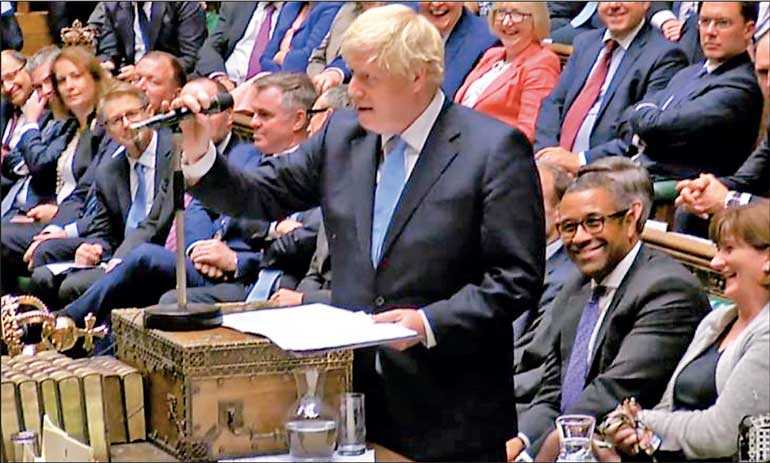Thursday Feb 26, 2026
Thursday Feb 26, 2026
Wednesday, 11 September 2019 00:00 - - {{hitsCtrl.values.hits}}

LONDON (Reuters): Prime Minister Boris Johnson said on Tuesday he would not request an extension to Brexit, hours after a law came into force demanding that he delay Britain’s departure from the European Union until 2020 unless he can strike a divorce deal.
For the second time in a week, lawmakers then rejected Johnson’s request to try to break the deadlock through an early national election.
With the future of Brexit mired in uncertainty, parliament was suspended until 14 October, sparking tense scenes in the House of Commons where opposition lawmakers held signs reading “silenced” and yelled “shame on you” at Johnson’s ruling Conservatives.
Johnson appeared to have lost control of Britain’s withdrawal from the European Union with the approval of the law, which obliges him to seek a delay unless he can strike a new deal at an EU summit next month.
EU leaders have repeatedly said they have not received specific proposals ahead of an EU summit on 17 and 18 October, at which Johnson says he hopes he can secure a deal.
“This government will press on with negotiating a deal, while preparing to leave without one,” Johnson told parliament after the result of the vote on an early election.
“I will go to that crucial summit on 17 October and no matter how many devices this parliament invents to tie my hands, I will strive to get an agreement in the national interest ... This Government will not delay Brexit any further.”
Opposition Labour Party leader Jeremy Corbyn said the party was eager for an election, but would not support Johnson’s move to hold one until it was certain a delay to Brexit had been secured.
“As keen as we are, we are not prepared to risk inflicting the disaster of no-deal on our communities,” Corbyn said.
Brexit, the United Kingdom’s most significant geopolitical move in decades, remains in question more than three years since the 2016 referendum, with possible outcomes ranging from an exit on 31 October without a withdrawal agreement to smooth the transition, to abandoning the whole endeavour.
The bill seeking to block a no-deal exit, passed into law on Monday when it received assent from Queen Elizabeth, will force Johnson to seek a three-month extension to the 31 October deadline unless parliament has either approved a deal or consented by 19 October to leave without one.
Responding to concerns the government could ignore the legislation, Foreign Minister Dominic Raab earlier told parliament that the government would respect the rule of law but added, “Sometimes it can be more complex because there are conflicting laws or competing legal advice.”
Johnson took over as prime minister in July after his predecessor, Theresa May, failed to push the Withdrawal Agreement through parliament.
Parliament returned from its summer break last week, and Johnson has lost all six votes held in the House of Commons since.
The suspension of parliament, or prorogation, will last for five weeks.
Under Johnson’s premiership, Britain’s three-year Brexit crisis has stepped up a gear, leaving financial markets and businesses bewildered by an array of political decisions that diplomats compare to the style of US President Donald Trump.
BlackRock, a US investment firm that manages $6.8 trillion of assets, said a no-deal Brexit or a referendum had become more plausible.
The pound trimmed gains against the dollar, to stand slightly higher on Monday at $1.234. It jumped to a six-week high of $1.2385 in London trading after economic data beat forecasts.